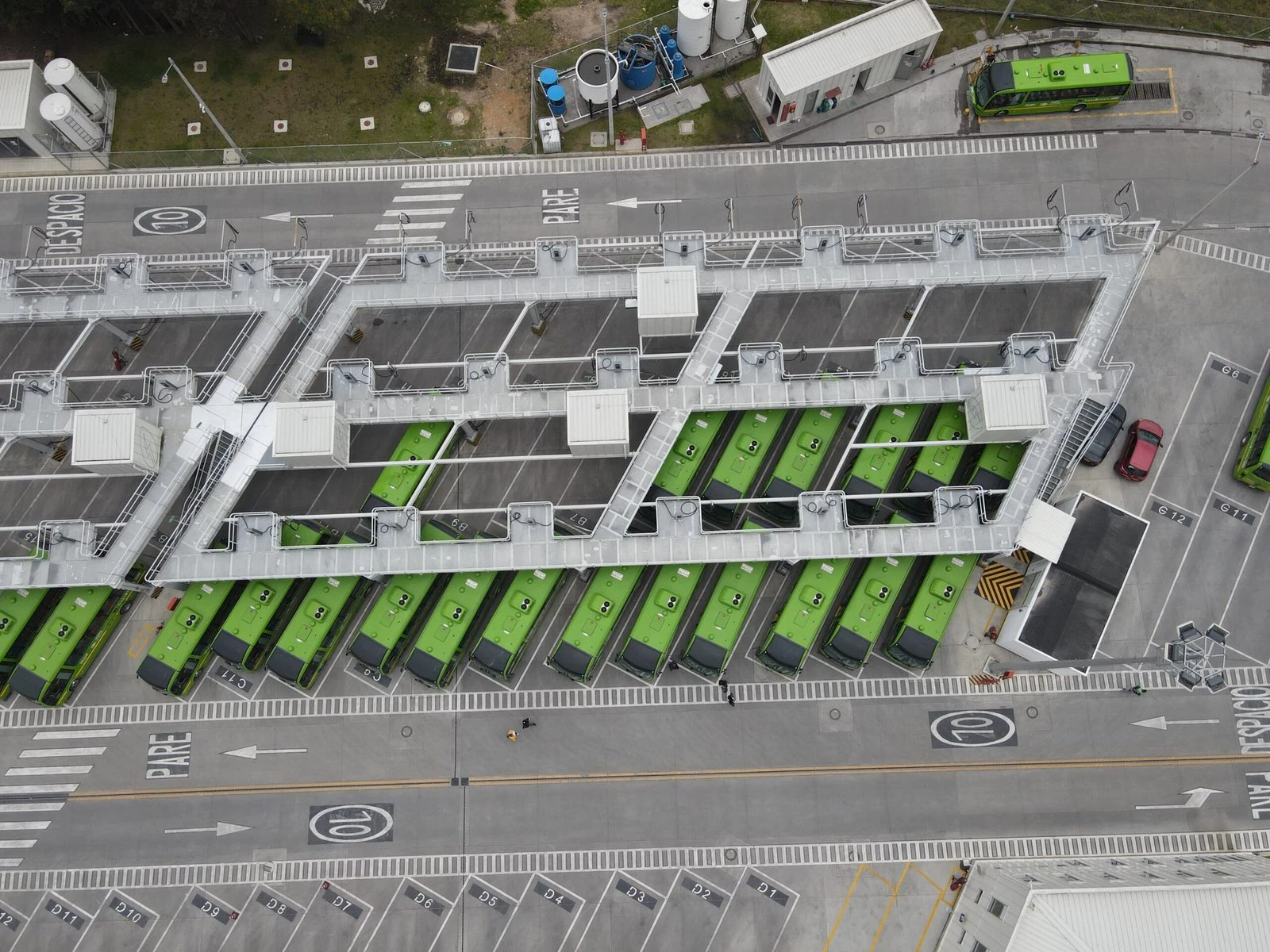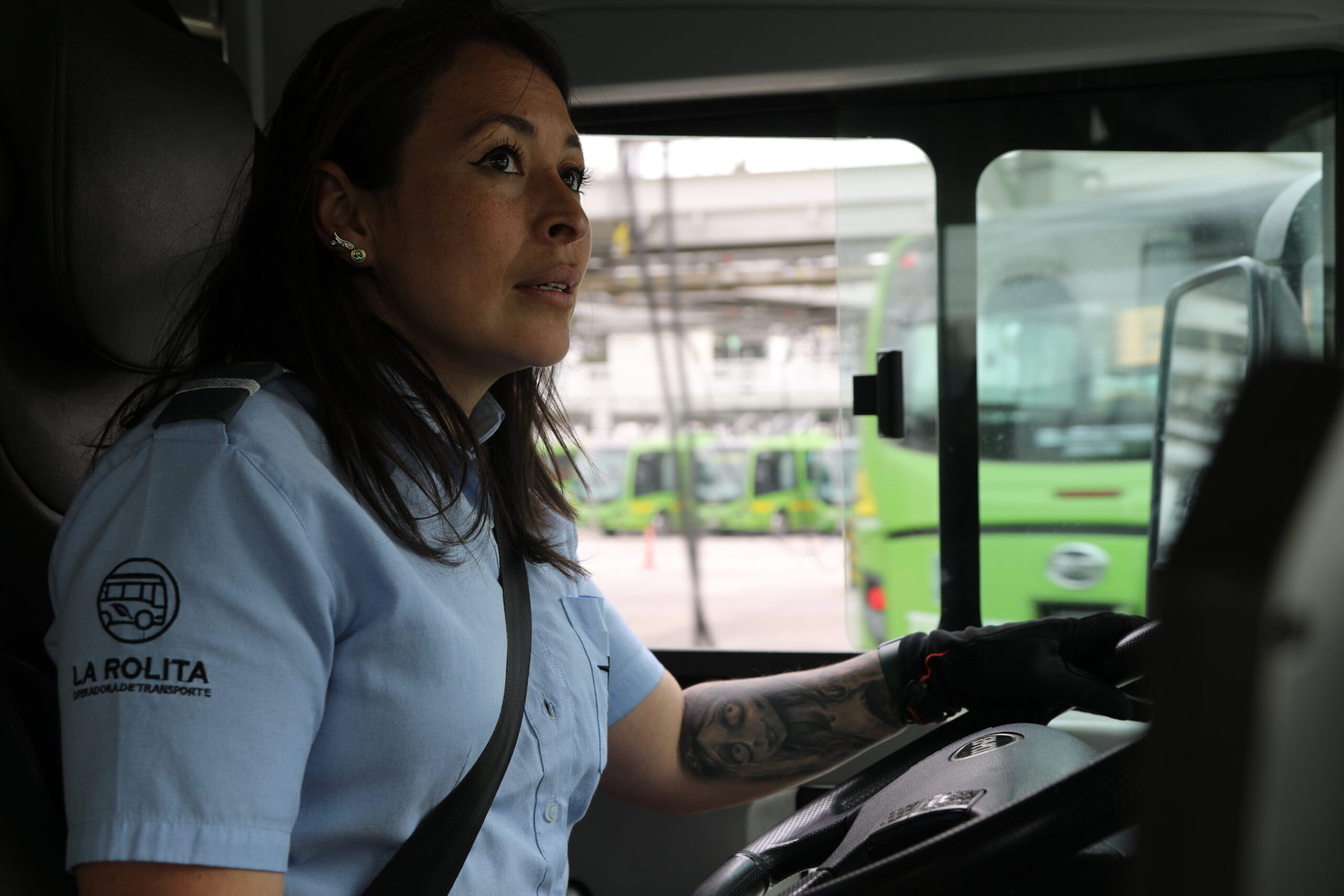childcare
The Women Bus Drivers Overcoming Stereotypes in Bogotá
When Paola Perez shifts into gear and puts her foot down on the accelerator, the lime-green bus zips forward with an almost-silent whoooosh. Neat rows of dozens of identical vehicles are visible on either side through its large rectangular windshield.
“This is a very beautiful place to work,” says Perez, as she steers the bus through the pleasingly symmetrical universe of white lines, smooth gray asphalt and angular metal platforms that house nearly 200 electric charging stations. “It’s new, it’s clean and it all works.”
 La Rolita’s 195 buses are 100 percent electric. Credit: Peter Yeung
La Rolita’s 195 buses are 100 percent electric. Credit: Peter Yeung
This impressive space in the southwest of Colombia’s capital, Bogotá, which opened in September 2022, is the headquarters of a project taking a rare gendered approach to urban mobility. Nicknamed La Rolita — a diminutive of the word for a person from Bogotá, un rolo or una rola — it is a public transit operator largely driven by women.
“It feels like a sorority,” says Perez, 37, who has been a driver since the start. “There’s a camaraderie. We speak to each other and help each other whenever we can.”
By placing women at the heart of La Rolita, which employs about 300 female drivers and is led by a female director, city authorities are creating a more sustainable, safe, equal and just transport system in the sprawling metropolis of eight million people.
 Paola Perez, who has been driving with La Rolita from the beginning, has found a camaraderie among the women who work there. Credit: Peter Yeung
Paola Perez, who has been driving with La Rolita from the beginning, has found a camaraderie among the women who work there. Credit: Peter Yeung
“This is a masculinized sector that we are working in,” says Carolina Martinez, the organization’s general manager. “But we are beginning to change that. There are many positive and important opportunities for us to benefit from in the long term.”
For one, according to Martinez, women bus drivers have fewer traffic accidents: La Rolita, which is the city’s only public bus operator, has the second-lowest number of injuries due to accidents — 72 in 18 months — when compared with the numerous private bus operators. (Other research backs this up: One study published in 2020 by Belgium’s road traffic institute Vias found that generally women drivers “take fewer risks behind the wheel than men” and “are less involved in serious accidents.”)
The presence of female drivers in public transit also helps female passengers to feel safer in the face of high levels of gender-based violence across the city, adds Martinez. A survey in 2020 found that 84.3 percent of women in Bogotá have experienced sexual harassment while using public transit.
The post The Women Bus Drivers Overcoming Stereotypes in Bogotá appeared first on Reasons to be Cheerful.
Setback in early childhood pay campaign as action called off
After campaigning since 2018, Early Childhood Educators (ECEs) are winning recognition at last for their essential contribution to society. Much more is needed, starting with pay but also conditions.
The childcare sector is in crisis.
Staff shortages leave children in danger and staff with burn-out. Workers love their job but are forced to work in intolerable conditions, so many just leave.
Members of the United Workers Union (UWU) have been fighting for a 25 per cent pay rise to deliver a rate equal to that of similarly skilled male workers in other industries. They are the 13th lowest paid sector in Australia.
“ECE is traditionally ‘women’s work’,” Nicki, a UWU workplace delegate working in a Melbourne centre, told Solidarity.
 Early childhood educator Nicki
Early childhood educator Nicki
“Our role in society is diminished like every other ‘background’ worker who goes unnoticed and unvalued. Unlike other feminised sectors, such as nursing and social work, which have had stronger union fight backs. ECE has been left behind.”
Union members were planning a walkout of centres on International Women’s Day (IWD) this week.
“The walkout was proposed as a measure ‘In response to ongoing inaction on low wages in the sector,’” Nicki said.
“It was called on IWD (8 March) to connect our struggle to the historical (and current) struggle for equal pay and conditions to our similarly qualified male counterparts.”
But UWU campaign officials acted to call off the action last week—drawing anger from many union activists.
Collective power
With the sector divided into small, isolated centres, the UWU is using new multi-employer bargaining laws to try to negotiate a pay rise with employers and the government.
“This is allowing us to use our collective power in a way that we’d never be able to use as workers negotiating with small businesses,” Nicki said.
“It can be very useful to help workers in lesser organised workplaces build collective power and fight alongside more organised places.”
Since the sector relies on government funding through childcare subsidies, the union is looking to the government to fund pay rises.
According to UWU officials, “At the latest Multi Employer Bargaining meeting on Friday 23rd February, significant progress was made on the Federal Government funding a wage increase.”
The union says now that the government has come to the negotiating table, “we made ‘progress’ and now we need to back off,” as Nicki put it.
But many union activists wanted to continue with the action on IWD.
“On Tuesday early afternoon, the Big Steps Campaign called an ‘Urgent Leaders Meeting regarding the MEB’ for Tuesday evening … This was a cross country Zoom meeting, with approximately 100 people from across the country.
“The first part of the meeting was a lot of pro-Labor praise and a ‘discussion’ about how Labor had committed to funding a pay rise in early childhood. There was no indication what that commitment was, when it would be announced, if it was anywhere near our demands.”
Anne Aly, Minister for Early Childhood Education, was even brought in to address the meeting.
“The chair went to quickly call a vote about postponing the walk out… as we ‘only had 15 minutes left and it was already quite late’. It became very clear that we were there to rubber stamp their decision—there had been no overt talk of postponing or cancelling before this and it was easy to see that people were confused.
“Members pointed out that it would be incredibly difficult to sell this idea to the membership at their centres, that we had done work with parents to make sure that as many as wanted to could walk out—some parents were excited to bring their children and support us. We talked about the feeling of being railroaded.
“Towards the end the organisers were scrambling to take back control—they proposed 24 hours for us to go back to our centres and talk with our membership and get their opinions. We took this as a win—this was a real culture change—members having a voice, a real voice, and active debate.
“Meeting number two was on Wednesday… it was smaller, and more tightly controlled. Several people who had been in the meeting on Tuesday, and openly dissenting, were not present.
“They again held a report back from Bargaining Delegates, as well as from Goodstart Early Learning Delegates who had lobbied in Canberra that day. Then we again went to a vote—with no dissenting voices heard.
Vague promise
“There was a discussion about what ‘we could do on the day instead’—ideas included inviting our local MP to the centre and morning teas. They also changed the parameters of the vote—taking it from a straight Yes/No to Walk Out, Organise Local Actions or Cancel the Day. Walk out received 15 per cent of the vote, local actions (whatever that means) got 62 per cent of the vote.
“There was a vague promise of Labor funding a pay rise, and that it was still being worked through. They’re obviously in negotiations for the budget in May, but this was incredibly vague.
“There were some obvious hope that Labor was finally coming through, and there was some well-earned cynicism at the promise that commits to nothing. Mostly there were a lot of educators who were tired of decisions being made for them rather than with them. And on the second night those voices were silenced or curtailed. I think that’s what a lot of the anger is about.
“This was not a democratic decision; and this is not how trade unionism is meant to work.
“We’ve been fighting for higher wages since I joined the sector and union in 2018. That campaign flowed into the May 2022 Federal Election. Again, there was a lot about ‘voting Labor’ to change our conditions.
“In September, they launched the ‘Setting the Standard’ campaign, which saw a walkout on Early Educators Day in early September. A couple weeks later, the government announced cheaper childcare, without mentioning anything for educators.”
The union’s top down approach undermines the rank-and-file involvement that will be crucial to building a campaign to win a pay rise from the Labor government.
Rank-and-file members need to pressure the officials to call the action that is needed, and to keep organising to fight for the pay they deserve.
They have no choice.
By Judy McVey
The post Setback in early childhood pay campaign as action called off first appeared on Solidarity Online.